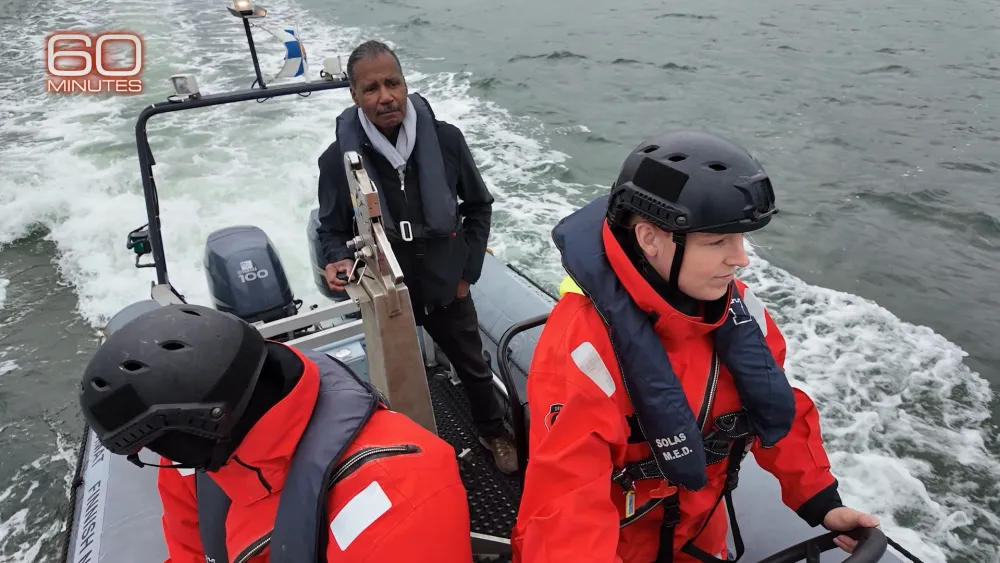
As a correspondent for “60 Minutes,” Bill Whitaker isn’t known for his juggling skills. At this moment, however, the CBS News veteran has several ambitious assignments for the venerable newsmagazine up in the air.
There’s one he hopes will be picked for the season premiere of the show’s 58th season, for which he recently traveled to Finland and the Baltic Sea, about a group of ships that have broken critical undersea internet and electricity cables in recent months. Authorities suspect the attacks are part of a campaign by Russia to rupture NATO allies’ underwater infrastructure. He has been working on the project for the past seven or eight months, he says during a recent interview. “I’m trying to peel this onion. Something is going on that doesn’t quite smell right, and how do you get to it? How do you figure out what is actually going on?”
Whitaker, 74 years old, is also working on a look at a sport that he believes “you have never heard of, but I guarantee you will soon hear of it.” And then there’s the story about a guy who is creating concert pieces out of animal sounds. Such activity, he says, “is the norm for ’60 Minutes,’” which will have its season premiere on Sunday, September 28. CBS has already started to promote the new cycle with a minutes-long promo, cinematic in scope, that debuted Sunday night and shows viewers the broad range of stories correspondents are preparing.
And yet, life at “60 Minutes” in recent months has been decidedly abnormal.
Producers, correspondents and staffers at the long-running program hope to emerge from a season of tumult during which the show became a political hot potato and the pawn in a bigger game between CBS News’ corporate owner, Paramount, and the U.S. government.
By now, the story is familiar to media-industry aficionados: In a suit filed in federal court in the Northern District of Texas in November 2024, President Trump alleged “60 Minutes” tried to mislead voters by airing two different edits of remarks made in an interview with former Vice President Kamala Harris, then Trump’s rival for the White House. Legal experts believed Trump had little standing. Management at Paramount, eager to win FCC approval for a sale to Skydance Media while grappling with downturns in its traditional business, agreed to pay $16 million to settle the matter. The deal subsequently closed.
Meanwhile, former top CBS News executives claimed Paramount was subjecting “60 Minutes” to greater-than-usual scrutiny of the types of stories it intended to air. Both Wendy McMahon, the CBS executive who oversaw the news division and CBS stations, and Bill Owens, the executive producer of “60 Minutes,” left, with Owens citing an increasing lack of ability “to make independent decisions based on what was right for ’60 Minutes,’ right for the audience.” Lesley Stahl, the veteran “60 Minutes” correspondent, told Variety in April that she was “devastated” by his exit and hoped corporate executives realized the show is “one of the reasons that CBS News is valuable.” The program is the most-watched news series on broadcast TV.
Tanya Simon, the newsmagazine’s former executive editor and a daughter of Bob Simon, one of the show’s former correspondents, has taken the reins of the show.
The staff, says Whitaker, now hopes to move forward. “All of this is beyond us, to tell you the truth. It’s beyond us,” he says. “A lot of the things that have gone on are things we have no influence over or power to change. The power we have is the power of storytelling; to be able to tell America’s story so Americans have the information we all need so we can all make decisions about how our government works. I think that’s what journalism has always been about.”
Some of the stories in the “60 Minutes” editorial pipeline will swing right off recent headlines. Scott Pelley, for example, in the aftermath of the Charlie Kirk assassination interviewed Spencer Cox, Utah’s Governor, about how to bridge the growing political divide in the U.S. and the importance of free speech. Pelley also went to Utah Valley University with Cox to speak with students who witnessed the Kirk shooting. Pelley has also traveled to Ukraine to report on war crime investigations in Sumy.
Other correspondents have caught up with people who have influence on culture. Jon Wertheim has talked to Dana White, commissioner of the UFC, about his quarter century at the helm of the league. Among their conversation topics: the coming 2026 UFC fight on the White House lawn. Stahl met with director Rob Reiner on the set of his new movie, “Spinal Tap II: The End Continues,” in New Orleans, checking in with him 41 years after the debut of the original film, “This is Spinal Tap.”
And some of the newsmagazine’s familiar faces plan to show viewers things they likely have never previously encountered. Anderson Cooper has been working on a report on how decades of armed conflict in Colombia created “no-go” areas where rare species of birds have been able to flourish. And Cecelia Vega traveled to the foot of Mount Everest with Nima Rinji Sherpa — – the youngest person to summit the world’s 14 highest mountains, who represents a new generation of Nepali climbers.
The newsmagazine’s previous season was filled with commotion, but Whitaker says there is noise about something tied to the show almost every year. “There is no normal season at ’60 Minutes.’ It’s chaotic and crazy and busy all the time.” Still, he notes, “we are all excited about pushing forward this season. It’s important to us and we think it’s important to the country.”



